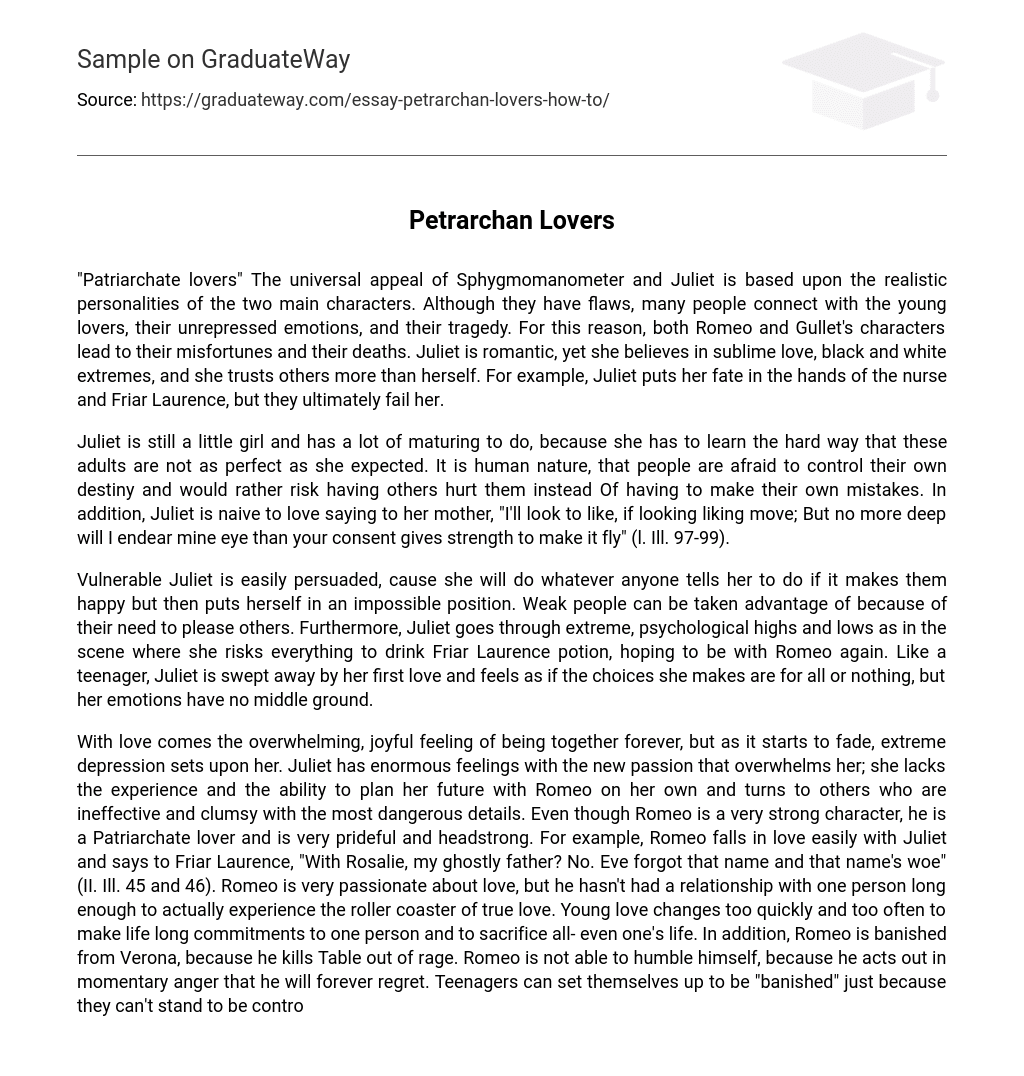“Patriarchate lovers” The universal appeal of Sphygmomanometer and Juliet is based upon the realistic personalities of the two main characters. Although they have flaws, many people connect with the young lovers, their unrepressed emotions, and their tragedy. For this reason, both Romeo and Gullet’s characters lead to their misfortunes and their deaths. Juliet is romantic, yet she believes in sublime love, black and white extremes, and she trusts others more than herself. For example, Juliet puts her fate in the hands of the nurse and Friar Laurence, but they ultimately fail her.
Juliet is still a little girl and has a lot of maturing to do, because she has to learn the hard way that these adults are not as perfect as she expected. It is human nature, that people are afraid to control their own destiny and would rather risk having others hurt them instead Of having to make their own mistakes. In addition, Juliet is naive to love saying to her mother, “I’ll look to like, if looking liking move; But no more deep will I endear mine eye than your consent gives strength to make it fly” (l. Ill. 97-99).
Vulnerable Juliet is easily persuaded, cause she will do whatever anyone tells her to do if it makes them happy but then puts herself in an impossible position. Weak people can be taken advantage of because of their need to please others. Furthermore, Juliet goes through extreme, psychological highs and lows as in the scene where she risks everything to drink Friar Laurence potion, hoping to be with Romeo again. Like a teenager, Juliet is swept away by her first love and feels as if the choices she makes are for all or nothing, but her emotions have no middle ground.
With love comes the overwhelming, joyful feeling of being together forever, but as it starts to fade, extreme depression sets upon her. Juliet has enormous feelings with the new passion that overwhelms her; she lacks the experience and the ability to plan her future with Romeo on her own and turns to others who are ineffective and clumsy with the most dangerous details. Even though Romeo is a very strong character, he is a Patriarchate lover and is very prideful and headstrong. For example, Romeo falls in love easily with Juliet and says to Friar Laurence, “With Rosalie, my ghostly father? No. Eve forgot that name and that name’s woe” (II. Ill. 45 and 46). Romeo is very passionate about love, but he hasn’t had a relationship with one person long enough to actually experience the roller coaster of true love. Young love changes too quickly and too often to make life long commitments to one person and to sacrifice all- even one’s life. In addition, Romeo is banished from Verona, because he kills Table out of rage. Romeo is not able to humble himself, because he acts out in momentary anger that he will forever regret. Teenagers can set themselves up to be “banished” just because they can’t stand to be controlled or proven wrong.
Furthermore, Romeo doesn’t think things through when he is in love, because just the thought of Juliet dead made him kill himself. Romeo acts upon every feeling without thoroughly thinking of the consequences, because he is impulsive and is ruled by his emotions. People may turn to suicide because they can’t think of any other way to escape from the horrific feelings inside. Romeo operates on a high emotional level, and his rash decisions are usually filled with heavy uniqueness which are impossible to take back and eventually snowball to his destruction.
In conclusion, Romeo and Gullet’s ill fated love isn’t caused by providence or the “stars”, but by their own weaknesses and choices. Romeo and Juliet don’t have the chance to learn that with the tempering of age and self knowledge, impulses can be governed and reasonable alternatives can be found in difficult circumstances. Through Romeo and Juliet, people who haven’t yet experienced much of life can learn that strong character defects can cause them harm if they aren’t restrained.





